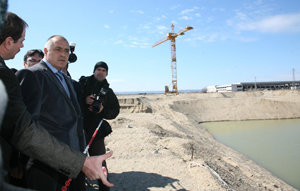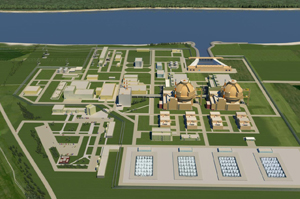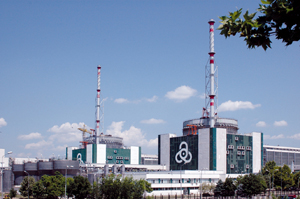The pros and cons of building a new nuclear power plant in Bulgaria - and why it matters to Europe
on
The pros and cons of building a new nuclear power plant in Bulgaria - and why it matters to Europe
Bulgaria has to decide whether to finish the construction of the Russian-made nuclear power plant Belene, which was started in the 1980s and halted in 1990 after the dissolution of the Soviet Union. The stakes are high, and not just for Bulgaria. A positive decision would make Belene the first Russian-built atomic energy facility within the borders of the EU.
 |
| Bulgarian Prime-minister Boyko Borissov inspects the Belene site in March 2010 (photo: Bulgarian government press-center) |
Bulgaria has used nuclear power since the 1970s. The first nuclear power plant (NPP), Kozloduy, was considered one of the technical successes of the country, and nuclear power a tool for greater energy independence. With nuclear power, even though the fuel is imported from Russia, Bulgaria has an overall energy supply independence of about 50%, which is near the EU average and much higher than many other countries in Eastern Europe.
More controversial, however, is the project for constructing a second NPP near the town of Belene. It was conceived almost 40 years ago and the foundations have in fact been laid, but no final investment decision has yet been made. The project still raises many questions in Bulgaria, ranging from 'do we really need a second NPP?' to 'Who should pay for it?'.
Foundations
At this moment, Bulgaria has two operational 1000-MW VVER-1000 units and four 440-MW units that have been taken out of operation and are waiting for decommissioning at Kozloduy on the Danube river bank. The first unit of Kozloduy was commissioned in 1974 and the two newest units in 1987 and 1991 respectively. In 2002, just before the decommissioning of the old units started, the plant produced 20.2 million MWh or 47.3% of the total electricity produced in the country. In 2010, with only two units operational, Kozloduy produced 15.2 million MWh, which represented 32.9% of the electricity produced in Bulgaria or 46% of the electricity consumption (Bulgaria is a net exporter of electricity).
The plan to construct a second NPP was advanced in the 1970s. On March 20, 1981 Belene, also on the Danube river bank, was approved as the site for the construction of the plant by a Decree from the Council of Ministers. The documentation for the site was prepared in late 1980 and early 1981 by Energoproekt Sofia - the state-owned energy engineering institute. The first preparations on the site started in 1981. The first foundations were laid in 1987 - after the Chernobyl disaster, which happened in 1986. The initial design was for four VVER-1000 reactors. In the period 1988-1990 about 40% of the construction work for the first reactor was finished and 80% of the equipment was supplied. Then, in 1990, the project screeched to a halt when the Soviet Union broke up and the transition to a market economy started. From that time on only maintenance work has been done.
In 2005, Belene was one of the first nuclear projects in the world to be revived 19 years after Chernobyl. The centrist government of the former King's party, NDSV, had already announced in 2002 that it wanted to restart the project. One of the main proponents was Energy Minister Milko Kovachev, who had worked at Kozloduy before. Some of the arguments in support of this decision were related to the power
| Perhaps the biggest drawback of the project is that it was planned, started, and restarted as a state-run enterprise, dependent on partisan support and state budget funds |
Positive spill-over
There has been an intense public discussion in Bulgaria over the last ten years about Belene. However, the debate is usually cast in a simple "Yes" or "No" format. It would be more useful to frame the discussion in a multi-layer format, e.g.:
"Do we want to build a new Bulgarian nuclear power plant?"
"Do we want to have Russian or other nuclear technology?"
"Are we going to finance the NPP with public funds/guarantees or as a purely private project?"
etcetera.
Such questions should help Bulgaria define better what its real needs are and how a new nuclear, Russian-built, publicly financed power plant would fit into the scheme.
Certainly the project has its pros and cons. An important argument in favour of Belene is that the site has been approved, the technical part has almost received final approval from the Bulgarian Nuclear Regulatory Agency and the technology is well-known in Bulgaria. It would be a loss of resources if the project was stopped now.
From the point of view of energy balance, Bulgaria may need new production capacity in some
| Belene is the only Russian project for a new nuclear power plant inside the EU and could be a showcase for other projects to follow |
In addition, a new nuclear plant would generate business for construction and technology companies. The demand for engineers and technical staff would grow, with positive spill-over effects on education, employment, and regional development in Northern Bulgaria.
Command economy
On the other hand, some observers argue that there are economically more attractive alternatives available. Bulgaria can still do a lot to improve its energy efficiency, especially in buildings and in industry. It currently is the lowest in the EU-27. Improved management of transmission and distribution grids would also help to lower energy consumption. At the same time, more and more renewable energy sources are coming online, and they will need balancing power plants, like gas-fired or hydro power plants, not large baseload plants.
Moreover, Kozloduy will probably receive a 10-year extension of its licenses for units 5 and 6 after 2017 and 2019 respectively, which will secure sufficient baseload energy for the country until 2027-2029. Around that time, a new tender for 4th generation reactors may be started, and new choices could be made.
 |
| Image of the planned new nuclear power plant at Belene(Source: NEK) |
Last, but not least, there is no long-term solution in Bulgaria for the safe disposal of nuclear waste and spent fuel. A second nuclear plant would only make this problem worse. If the costs of waste disposal and future decommissioning costs are included, the real costs of the electricity produced by Belene may turn out to be significantly higher than is assumed now.
Strategic investor
So how likely is it that Belene will be built? There are several reasons to believe in the project. The fact that 14 amendments to the initial EPC (engineering, procurement and construction) contract have been signed shows that the two parties are not ready to give up the project. The main purpose of the last amendments has been to postpone the start of payments from NEK to Atomstroyexport. The last amendment has a deadline at the end of March 2012. However, both parties have also filed arbitrage cases against each other - NEK is claiming 61 million euros from Atomstroyexport and the Russian company is claiming 58 million euros from NEK.
Clearly for Atomstroyexport in particular there is a lot at stake. Belene is the only Russian project for a new nuclear power plant inside the EU and could be a showcase for other projects to follow. That could be a reason for the Russians to be willing to undertake the project, even if the business case is not so strong.
Then again, there are also reasons to doubt that the project will ever be completed. Financing is probably the biggest hurdle. The restart took place within the structure of the former state-owned monopoly company NEK EAD. This company has been partially unbundled in recent years, but is still
| In the end, the decision about Belene may not be so much about economics as about politics |
As a regulated company NEK could not finance the project on its own in any case. This was the reason to organize a tender for private investors in 2009, which was won by RWE. However, the German company later cancelled its participation. This left NEK with an EPC contract with Atomstroyexport/Rosatom and no options for co-financing. The only option at this moment would be forRosatom to finance a large part of the construction works and become a shareholder in the project, but that would make Bulgaria heavily dependent on the Russians.The government has now hired financial consultant HSBC to restructure the project and find a new strategic investor.
Another negative factor is that the liberalization of both national and regional markets in South Eastern Europe may lead to an insecure market on the demand side. Wholesale prices in the region were about 70-80 euros per MWh only three years ago, now they are about 50% lower. Obviously very few market parties would give any price guarantees for Belene's lifespan of 60 years.
Finally, the increased anti-nuclear feeling in Western Europe may impact the chances of Belene. It may lead to stricter international regulations, which might make it necessary to make changes to the project, and which could lead to higher costs. Atomstroyexport announced earlier this year that it is ready to improve the technical project, even going as far as building anti-tsunami walls, if NEK wants it and is ready to pay.
Hot topic
 |
| Reactors 5 and 6 of the Kozloduynuclear power plant on the Danube river bank (photo: NPP Kozloduy) |
The rightist presidential candidate, Rosen Plevneliev, who won the elections and will succeed Parvanov as President, has another view. He has said he will only look at economic and financial criteria. He has referred the issue to energy experts, claiming that such projects should not be viewed politically. However, it is no secret that the Socialist party's position is traditionally pro-Russian, while the right-wing GERB's position is predominantly pro-American. While the socialist party has supported the Belene project throughout most of its lifetime, GERB - currently the ruling party - has been more critical all along. The GERB-led government is also looking at the possibility of building new nuclear reactors at the Kozloduy site rather than at Belene, and using US instead of Russian technology and fuel.
For Europe, the Bulgarian decision on Belene has important implications. One way or the other, there will be substantial effects on the Bulgarian and South East European electricity markets, a great symbolic effect on the "nuclear renaissance" in Europe, and geopolitical effects in terms of relations with Russia and the US. It will also be interesting to see whether the Belene case will become included in the EU's newly proposed External Energy Policy - if this ever gets off the ground.
|
Current Belene NPP Project Technical Data
EU Support -Notification Procedures Completed in the European Commission
(Source: NEK EAD) |
|
Who is Atanas Georgiev? Atanas Georgiev is assistant professor at the Faculty of Economics and Business Administration (FEBA) at Sofia University. He coordinates the Master Programme "Economics and Management in Energy, Infrastructure, and Utilities". From 2005 to 2009 he worked at Uconomics Ltd, first as a consultant in energy sector restructuring, later as managing editor of the Bulgarian "Utilities" Magazine and programme manager for a number of trainings and conferences in the fields of energy, infrastructure and utilities. He has published a number of articles about the energy and utilities sector. Since January 2010, he has become managing editor of publics.bg - an online professional medium supporting the development of public services and energy in Bulgaria. He can be reached at ageorgiev@publics.bg. See also his earlier articles on the Bulgarian gas market for European Energy Review: |


Discussion (0 comments)